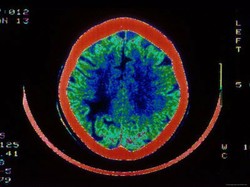
The Human Brain Scan: Neuropsychology Tests
by bhthanks
The human brain scan & neuropsychology tests to determine brain function for brain surgery, testing rats vs humans for brain damage, & neural mechanisms of learning for survival.
Human Brain Scan
 |  |
| Digitized Cat Scan Human Brain Photog... AllPosters Only $19.99 | Human Brain Normal CT Scan Photograph... AllPosters.com |
Brain Scans will render Behavioral Tests of Brain Damage obsolete
The current rate of progress in the development of new and better brain scanning devices will soon render behavioral tests of brain damage obsolete. Behavior tests are written tests based on behavior. Soon, these will no longer be useful or necessary, because with these new brain scanning techniques, we can look at the brain without opening the skull, and see where the blood flow is going and where there is activity. This is more reliable than a behavior test, because it is more accurate. Behavior tests are unclear and based on assumptions, while these techniques involve looking at actual scans of the brain.
Neuropsychology Tests
 | A Compendium of Neuropsychological Tests: Fundamentals of Neuropsychological Assessment and Test ...Oxford University Press / Only $174.06 |
 | A Neuropsychologist’s Guide to Training Psychometrists: Promoting Competence in Psychological Tes...Routledge / Only $31.8 |
Neuropsychological Tests should be done before and after surgery
All patients should complete a battery of neuropsychological tests both before and after neurosurgery. One needs to conduct these tests before the surgery, in order to accurately understand what is wrong, and after the surgery to see if the surgery was done right and had the proper results. The neurosurgeon would compare the "before" and "after" to see if the situation improved, stayed the same, or deteriorated and got worse. In order to see if there is any change, if the problem was corrected, and the affect of what was done, one would need to compare the battery of neuropsychological tests which the patient took both before and after the neurosurgery.
Testing for Brain Damage
 | The Halstead-Reitan neuropsychological test battery: Theory and clinical interpretationNeuropsychology Press / |
 | The Bicycle Test: Finding Belief, Purpose, and Hope after a Traumatic Brain InjuryDamian Wasowicz / |
Testing Rats vs Testing Humans for Brain Damage
When testing rats to determine which one has a lesion in an unknown structure, the approaches used would certainly differ from that which might be used to test a human patient suspected of having brain damage. One could open up the brain of a rat while keeping it alive, and one would not be so quick to do the same with a human. For the rat, one would open up and stimulate the brain with an electrode, and watch what happens with the rat's behavior, as well as monitoring changes on a meter. On the other hand, for humans, one would be more likely to take scans and pictures, such as with an MRI and the other new brain scanning devices. This would be the preferred option, to avoid having to invade the human brain. One can be invasive with rats but not with humans. In addition, all activity can be pinpointed much more easily in a rat than in a human, since a rat has a much simpler brain, and it is much easier to see the effects on the pain, pleasure, hearing, and speech etc. centers of the brain.
Neural Mechanisms of Learning
 |
| Neural Mechanisms of Learning and Memory MIT Press Only $24.0 |
Neural Mechanisms of Learning Necessary for Survival
The search for the neural mechanisms of learning should focus on forms of learning necessary for survival in the wild. Although it appears as if humans are more civilized, our origins are in the wild, so there's bound to be a connection between the wild and now. Americans don't live in the wild, but when one goes on vacation, one usually stays in a cabin or a place that is more natural. Our nature is to go outside, such as to the park. In some countries, people live in the wild. Therefore, we need to study forms of learning necessary for survival in the civilized world, as well as forms of learning necessary for survival of people living in the wild. This is because we are biologically programmed for hunting and living in the wild. When we go camping, we are going back to nature. We need to understand by looking at how we learnt, back at our origins of the wild, and apply it to our contemporary world. Therefore, we need to study and understand both the new mechanisms for surviving in the wild as well as in our world. Some people like to hunt, since this is an original natural instinct.
You might also like
Custom Ernst Haeckel on T-Shirts and GiftsAre you excited about biology? Zazzle is the comprehensive POD for Ernst Hae...
SleepCan't sleep? Sleeping too much? Always tired? Importance of sleep, how to go ...



 eFaxon 05/11/2012
eFaxon 05/11/2012
 BNSF's Case of Illegal Genetic Screening in the Workplaceon 01/01/2012
BNSF's Case of Illegal Genetic Screening in the Workplaceon 01/01/2012
 Delicious Cake Recipes From Scratchon 04/03/2012
Delicious Cake Recipes From Scratchon 04/03/2012
 Easy and Delicious Recipes for Newbieson 04/03/2012
Easy and Delicious Recipes for Newbieson 04/03/2012



Comments